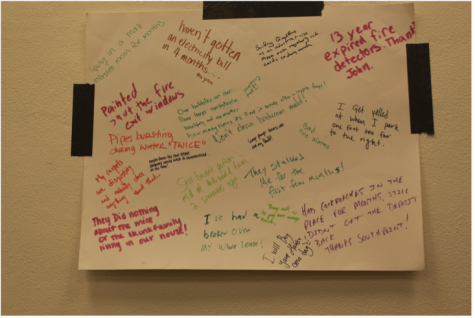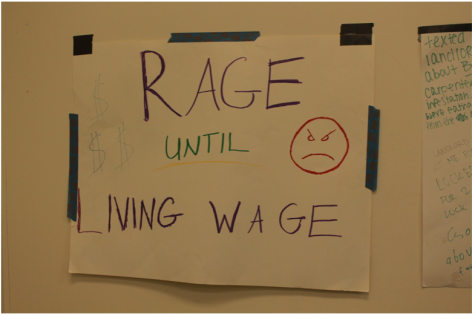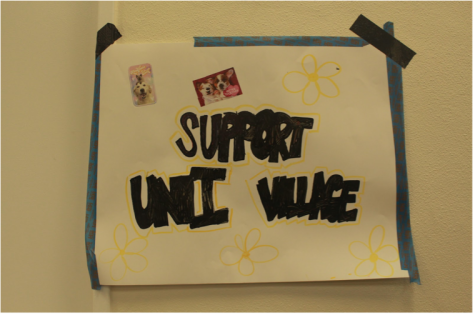The Graduate Employee Organization (GEO) held a housing forum on Wednesday evening where about 30 graduate students gathered in the Campus Center to talk about issues around their living situations.
Several posters were plastered on the wall displaying phrases such as “RAGE UNTIL LIVING WAGE” and “SUPPORT UNI VILLAGE” written in marker.
GEO membership organizer Kevin Sun helped organize the forum, along with general member Thomas Morrison, a philosophy doctorate candidate.
Over the last few months, Sun said the GEO has been working to organize members to confront the University of Massachusetts not only as an employer, but as a landlord. A majority of GEO’s month-long organizing has involvedworking closely with residents of University Village, where many residents have voiced concerns around their living conditions.
Sun said that GEO wanted to expand upon this work, hence the idea for a housing forum.
The forum started with small breakout groups, where students sat in a circle and discussed issues regarding landlord interactions, heating bill costs and maintenance.

One group was led by Morrison who moderated the conversation and asked, “What’s your s****y landlord story?”
The first attendee to share was Brenda Quintana, a graduate student studying labor studies. She is currently living in the town of Florence, 20 minutes south of Amherst. Quintana said that while her place was more affordable than what she had looked at in Amherst, the age of the house has not helped with temperature regulation.
“The heating expenses were absurd because of how poorly insulated the house was,” Quintana said.
She was able to receive a utilities discount for heating costs. According to Quintana, however, her landlord said last winter they would “look into” resources for making the house more energy efficient.
Yet, this did not occur before Quintana had to pay for utilities. She noted that even with the discount it still cost “hundreds of dollars” on the bill.
“I had no idea, and I picked this place because it was supposed to be cheaper,” she said.
This is a common occurrence in college towns, such as Amherst and Northampton, where many housing and apartment complexes are older. Landlords are more likely to rent out properties that are in poor conditions and this often leads to an array of problems for tenants, such as excessively high heating and electricity bills.
The group also discussed the relationship between housing affordability and working graduate student employment hours. According to the UMass Student Employee Handbook, it is recommended that a student doesn’t work more than 20 hours per week while taking classes.
That is not the case for most students, according to Shahryar Mooraj, a doctorate student in mechanical engineering, who estimates closer to 40 or 50 hours of work.
Mooraj added that he knows a few doctoral students who have had to work side jobs, noting that it is not sustainable.
Morrison asked the assembled group about potential solutions that UMass could create to fix the issues mentioned.

Isenberg doctoral student Dana Hassani discussed guaranteeing undergraduate students on-campus housing.
“If undergraduates can all live on campus, then there won’t be any stress on the overburdened housing market of this area,” Hassani said.
Morrison closed the small group conversation by discussing tenant organizing principles to address the lack of communication that tenants can experience.
Afterwards, GEO member Anna Walden divided attendees into four groups, based on the areas that students were living in — Northampton, Central Amherst, Sunderland and North Amherst.
The forum also featured two speakers, Emily Daniell, Student Legal Services Office staff attorney, and Connecticut Tenants Union member Katy Slininger. Daniell opened with a presentation on tenant rights and housing regulations to educate those in attendance.
Slininger spoke via Zoom, introducing herself as a new tenant organizer for The Lofts at Cargill Falls Mill, an apartment complex located in Putnam, Connecticut. Originally a textile mill, it was converted to housing in 2020.
After three years of living there, Slininger was alerted last December that a two-year-old child had severe lead poisoning. She was concerned for not only her own health, but for the health of her three-year-old son.
“The dust wipes in that child’s apartment had tested at 4,800 times the EPA limit for lead dust within a square foot of flooring,” Slininger said. “This shouldn’t have been an issue within an apartment complex that had been redeveloped so recently.”
Afterwards, German studies doctorate student Nagihan Ince introduced herself as a University Village resident and emphasized the work that residents have done to bring their issues to the attention of the chancellor.
Previously known as North Village, the housing complex was demolished and rebuilt as University Village. Residents moved in last fall, but the new complex remains under construction. Despite being recently renovated, residents have experienced issues such as infestations, lack of heating systems and child safety, according to Ince.

Ince also questioned the affordability of University Village, where monthly rent averages $1,600.
While the UMass Board of Trustees voted during their April 13 meeting to increase tuition and housing costs, it was noted in the Administration and Finance Student Advisory Board’s meeting on April 20 that the 4 percent increase would not apply to University Village.
Olivia Capriotti can be reached at [email protected] and followed on Twitter @CapriottiOlivia.




















